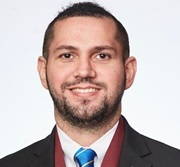
Ricardo Correa, MD, EdD, FACP, FAPCR, CMQ, is the Program Director for Endocrinology, Diabetes and Metabolism Fellowship and the Director for Diversity of Graduate Medical Education at the University of Arizona College of Medicine-Phoenix; Staff Clinician and Researcher at Phoenix VAMC and Faculty at Mayo School of Medicine, Mayo Clinic-Arizona and Creighton SOM-Phoenix campus. He is Editor of Dynamed, SGIM Forum, JGIM and outreach unit director of Endotext.org and Thyroid manager and multiple other journals.
He completed his Medical School and Education Master at the University of Panama. He completed a research fellowship in Epidemiology and Tropical disease at ICGES in Panama City and his internal medicine residency at Jackson Memorial hospital-University of Miami (UM) program. In 2012, he was honored with the AOA and GoldDOC Award. Then he pursued his clinical and research fellowship in endocrinology, diabetes, and metabolism with a special focus in neuroendocrine research at NIH.
He was trained in Evidence-based Medicine at McMaster University in Canada and in the Editorial process and OJS by LATINDEX.
Dr. Correa has been involved in multiple academic, scientific, and educational activities. Dr. Correa has published more than 40 papers in the peer review journal, has one NIH Grant, and is part of multiple scientific journal editorial committees, etc. Also, he is a consultant for the Latin-American science center including Bolivia and Panama national science department. He is a national speaker for adrenal and pituitary topics as well as healthcare disparities and transgender.
He is board-certified in Medical Quality. He is the author of the book titled Case Report: Basics and Publication. His research is focused on the study of long-term consequences of hormonal replacement therapy on the transgender population, subclinical Cushing and adrenal incidentaloma, and using a peer support system to decrease the burden of diabetes complications in the underserved Hispanic populations in different region of the country. Besides this he is doing a collaboration with other GME communities on how to improve recruitment into GME.